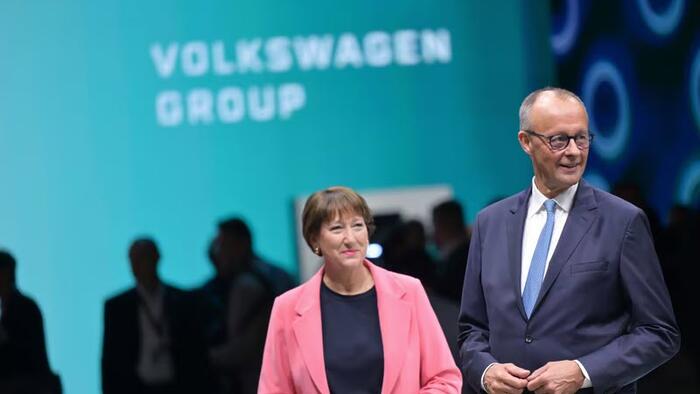


Submitted by Thomas Kolbe
Politics is the art of the possible, as Otto von Bismarck famously said. The auto summit at the Chancellery shows that, in Germany, nothing seems to work anymore. Politics refuses any gradual departure from the eco-socialist course.
Thursday was an eventful day—at least from the federal government’s perspective. No sooner had Chancellor Friedrich Merz and his deputy Lars Klingbeil given the bottomless pit of “citizens’ income” a new label than they turned to the next crisis hotspot of the republic: the collapsing automotive industry.
At the auto summit convened by the Chancellor, government members, state premiers of affected regions, business representatives, and unions gathered to discuss the future of eroding automotive production.
Dramatic Situation
The situation was clear—and dramatic. Since 2018, the German automotive sector has suffered a 25 percent production decline. In just the past twelve months, 50,000 jobs have been lost. One of the pillars of the German economy is eroding—unstoppably.
The reasons are obvious: a homegrown energy crisis due to the exit from Russian gas and nuclear power, the politically forced transformation to electric mobility, and relentless competition from China. All of this makes life hell for manufacturers.
This diagnosis applies to the entire German economy. Energy-intensive production under current regulatory and energy-policy conditions is simply no longer competitive. Around 250,000 industrial jobs have been cut since 2018—well-paid skilled workers are losing their positions—so much for the supposed skills shortage.
Logic in Exile
The obvious consequence—hundreds of thousands of jobs at risk in the coming months—would be a radical course correction: the end of the ideologically ossified Green Deal, which has turned Europe into a high-risk zone for international capital.
But what counts as “normal” in German politics or in Brussels offices anymore? As with the citizens’ income, the auto summit is less about solutions than about spectacle. Willingness to reform is faked, competence feigned—while the system that created the crisis remains untouched. Illusion over substance, show over content.
The economy’s quiet grumbling over energy costs and the electric-vehicle dead end was dispersed by Merz, Klingbeil, and co. in the usual way: a new, multibillion-euro subsidy for electric cars is supposed to bring the turnaround. An instrument that recently failed has now been resurrected, as the new special fund seems to make politics’ horizons infinite.
To appease criticism within their own ranks regarding the combustion engine ban, the Chancellor floated an extension for plug-in hybrids and range extenders. But fundamentally, the combustion engine ban remains, following the SPD line, which essentially mirrors the green hardline ideology that has driven the economy to collapse. Everything else is window dressing to make the political slogan of technological openness appear meaningful.
Media Games and Hardline Ideology
Vice Chancellor and Finance Minister Lars Klingbeil of the SPD also spoke, harmoniously and in agreement with the substance. He endorsed pragmatism and flexibility—in plain terms: We recognize that automotive production in Germany may soon belong to the past. But essentially, that does not bother us, since we trust it will no longer be needed in eco-socialist Europe under Brussels anyway.
According to the Berlin bubble’s political vision, family cars and second vehicles will soon be relics. The future of mobility should be green, just not individual. It is based on a confused plan for state-operated public transport.
The few electric cars approved in the distant future are likely to be privileged status symbols, rarely owned, usually rented for short periods. Green revenge on the long-resisting German citizen.
To be clear: this auto summit called by the Chancellor was nothing but a political show. A carefully staged media event, fitting seamlessly into the PR games Merz treats as a form of politics. Consider the “Made for Germany” coffee klatsch, which faked an investment offensive, or the almost embarrassing rebranding of citizens’ income into basic security.
Regardless of the coalition constellation over recent years, the goal has always been the same: to consistently push the restructuring of the economy into an eco-socialist foundation in key sectors of industry and energy.
Predictable End
The ruling political ideology’s preferred solution—and the one that applies to all economic misdevelopments today—is predictable: new subsidies and another electric car purchase bonus. The summit ends as no one should be surprised. The long-dried subsidy channels of the green favored economy are flooded with fresh state credit. True to the stock-market motto: the tide lifts all boats.
Anyone following the bond markets closely can see that this policy is bound to end in fiscal, economic, and ultimately societal fiasco. About three years ago, secular shifts away from increasingly risky government bonds began, making financing of political grandiose dreams more difficult in the future. The end of this policy will come when the bond market finally lowers its thumb. Until then, we can look forward to the next summit.
-
- *
About the author: Thomas Kolbe, a German graduate economist, has worked for over 25 years as a journalist and media producer for clients from various industries and business associations. As a publicist, he focuses on economic processes and observes geopolitical events from the perspective of the capital markets. His publications follow a philosophy that focuses on the individual and their right to self-determination.
